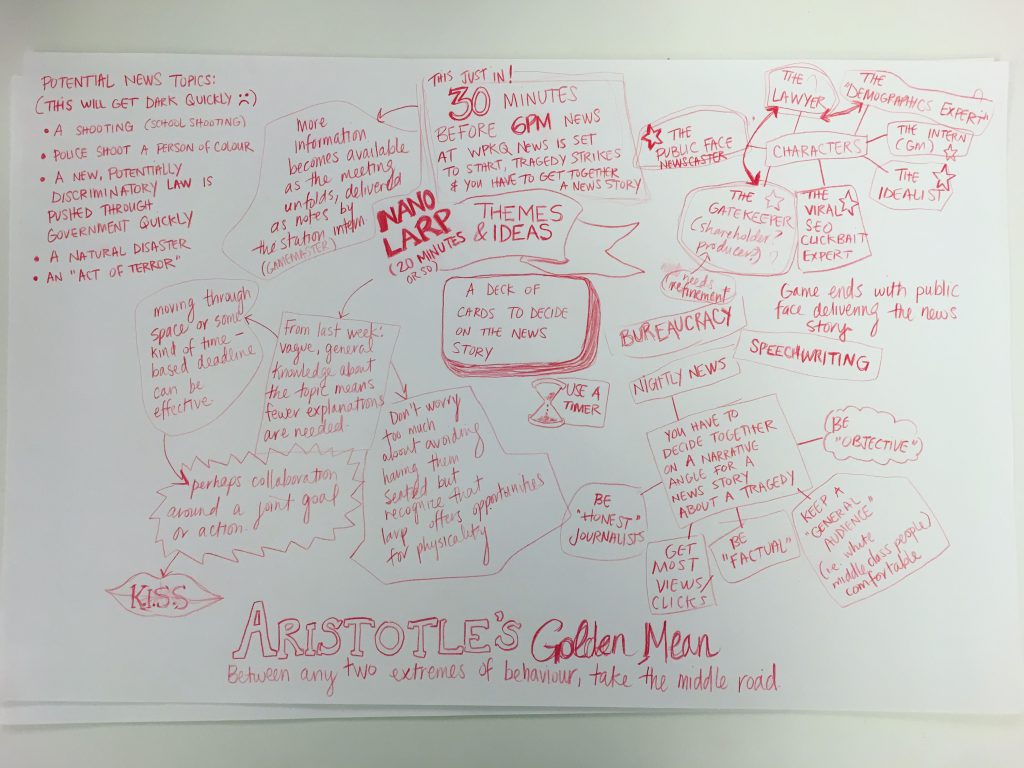As you might have realized from my posts over these past few months, I’ve been working with and researching larps since October or so. Last week, I ran my first larp, a pre-made nanolarp called “Abattoir” — you can read my previous post about that here.
In the time since then, I set a deadline for myself to create my own nanolarp. From start to finish, including the discussion before the game and the debrief afterwars, this larp should take around forty-five minutes to play.
For a long while, while reading up on all these topics, I struggled to find a topic that I could explore in a short larp for the reflective games group to play. Last week, when I finally sat down to do some brainstorming and create a mindmap, the tumblers fell into place in the lock and in about an hour, I had the basics of the game decided and put into place. I just had to develop characters and a self-contained ruleset based on my research.
This morning, I playtested the larp with the Reflective Games group.
In a nutshell, this is a larp about subjectivity and how different networks “spin” the news – there are overarching, oversimplified narratives that show up time and time again in news stories.
You can read, or even play, the entire larp here on itch.io. Here’s a ringing endorsement from one of the players who playtested with me this morning:
“Thank God I didn’t go to journalism school.”
A little more on how the playtesting went:
The players appreciated the flow of information — it stimulated their conversation and added a good level of complication. Players were aware of the kinds of news narratives they were reproducing as they were producing them, which created a kind of unease. For some players, they avoided bringing up certain narratives deliberately (i.e. mental health), while other players said that they embraced their role and said whichever shitty thing came to mind.
When asked to tell me about something memorable that happened during play, players highlighted these occurrences:
* Trying to negotiate the meta and self-awareness around the topic of mainstream news outlets was satisfyingly awkward. One player said that this felt like it was probably pretty true to what happened in these kinds of spaces, with “edgy” content slowly grounded down until it had no edge.
* The news team agreed, at Station Management’s insistence, that they should not mention the “alt right” in the news cast, since it might alienate some of their viewers. During the news cast, “alt right” accidentally slipped out, and the reaction from Station Management (shock) and the Young Idealist (Pulitzer! Pulitzer!) was very satisfying.
* The alarm that signaled the end of the discussion was surprising and memorable when it came – one player felt that this was a nice moment.
Here’s some of the feedback that players provided to improve the game:
About the news cast at the end, players suggested that perhaps they might be able to work jointly on a kind of teleprompter script or to have players take notes. I’ve decided not to go that route, but have decided to encourage the newscaster (who needs to deliver the news report) to take notes. Additionally, the folk in the Reflective Game group suggested that I emphasize that they will indeed have to give a sixty second report at the end of the game.
There were some adjustments to be made in terms of the instructions for the players to let them know what they ought to be doing. From my own observations, I decided to make it explicit that players should introduce themselves, and have added in a warm-up exercise to get players into character and more comfortable with the play.
On the whole, I’m quite satisfied with how this larp played, although I’m aware that the people who played with me this time around were an ideal audience, and that the game might play differently with another group. That’s just how larps work, I guess.
For now, I’ve decided to release this as a prototype with the one “tragedy” that I ran today. In the future, I would like to develop other situations and create a deck that could be shuffled, or a table of results which could be chosen from with dice rolls.

